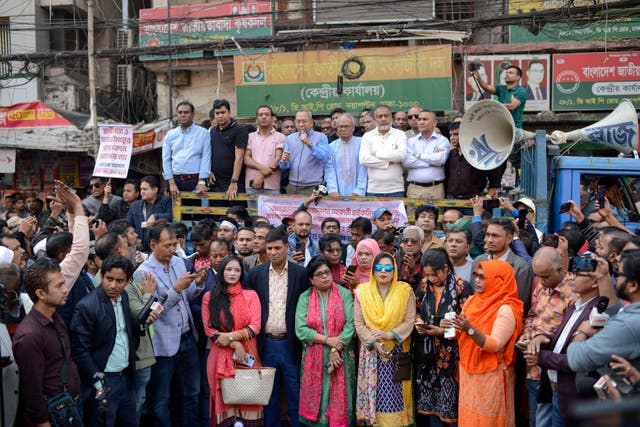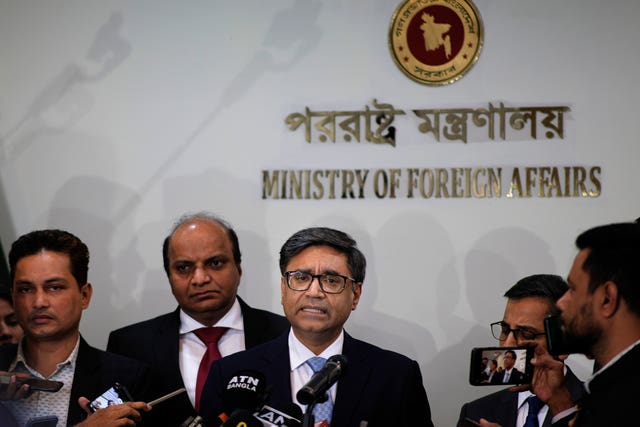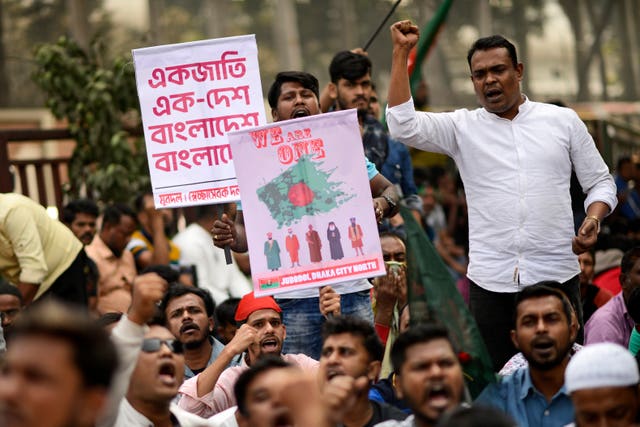Bangladesh and India hold talks aimed at defusing tensions over alleged attacks
It is the first high-level visit by an Indian official since massive protests ended Sheikh Hasina’s 15-year rule.

The foreign secretaries of Bangladesh and India met in Dhaka to discuss the strained relations between the two neighbours, including the growing tensions after former Bangladeshi premier Sheikh Hasina fled into exile in India in August.
This is the first high-level visit by an Indian official since massive protests ended Ms Hasina’s 15-year rule.
Tensions spiked further over the recent arrest of a Hindu spiritual leader in Bangladesh, currently run by the interim government led by Nobel laureate Muhammad Yunus.

India also stopped issuing visas for Bangladeshis except for emergency medical visas after Ms Hasina’s ouster while many Indian nationals taking part in infrastructure projects left Bangladesh because of security threats.
Alleged assaults targeting minority Hindus in Bangladesh and an attack on a Bangladesh diplomatic mission in India featured prominently in Monday’s talks between the Indian foreign secretary Vikram Misri and his Bangladeshi counterpart, Mohammad Jashim Uddin.
After the meeting, Mr Misri told reporters that there was not any reason for the mutually beneficial relationship between the two countries not to continue.
“To that end, therefore, I have underlined today India’s desire to work closely with the interim government of Bangladesh,” he said.
Mr Misri also said he discussed with Mr Uddin recent developments and relayed “concerns, including those related to the safety, security and welfare of the minorities”.
In a media statement later on Monday, India’s Ministry of External Affairs said that Mr Misri highlighted New Delhi’s support for “a democratic, stable, peaceful, progressive and inclusive Bangladesh”.

He also reiterated India’s willingness to build a positive and constructive relationship with Dhaka, based on mutual trust and respect and mutual sensitivity to each other’s concerns and interests, the statement added.
Separately, Bangladesh’s Mr Uddin told reporters that Bangladesh asked India not to interfere in its internal affairs, Dhaka-based Daily Star newspaper reported.
“We said people of all religions in Bangladesh freely practice their faiths. This is our internal affair.
“It is not expected (of other countries) to make comments on our internal affairs. We don’t do it for other countries,” the English-language daily quoted him as saying.
Following the ouster of Ms Hasina, thought to be a trusted friend of India, minorities — particularly Hindus — have reported widespread attacks in the Muslim-majority nation of Bangladesh.
Most Bangladeshi Hindus are thought to be supporters of Ms Hasina’s secular Awami League party.

Last month’s arrest of Hindu leader Chinmoy Das Prabhu — who led large rallies in recent months demanding better security for Hindus living in Bangladesh — further fuelled more anger.
Hindu leaders in Bangladesh said lawyers willing to stand for Mr Prabhu seeking his bail were threatened, and earlier this month no lawyers appeared in court for him when a court was scheduled to hear his bail petition.
Hindus recently attacked a Bangladeshi diplomatic office in Agartala, the capital of the north-eastern Indian state of Tripura, demanding his release.
Protesters also burned Bangladeshi flags in Kolkata, the capital of India’s eastern state of West Bengal, triggering protests and marches by political parties including the Bangladesh Nationalist Party headed by Khaleda Zia, Ms Hasina’s main political foe, and Islamist groups.
In Bangladesh, reports of the desecration of the Indian flag, with some burning it and others laying it on the floor for people to step on, strained relations further.
Hindus recently attacked a Bangladeshi diplomatic office in Agartala, the capital of the north-eastern Indian state of Tripura, in reaction to the arrest of Mr Prabhu, who had led large rallies in recent months demanding better security for Hindus.
Late last month, Hindu protesters also burned Bangladeshi flags in Kolkata, the capital of India’s eastern state of West Bengal, triggering protests by the Yunus-led government.
The Indian foreign secretary is expected to pay courtesy calls on Mr Yunus and foreign adviser Touhid Hossain before leaving for New Delhi later on Monday.





